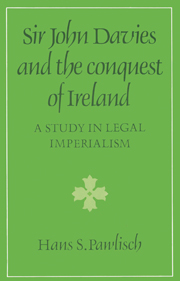Book contents
- Frontmatter
- Contents
- Preface
- Abbreviations
- PART I INTRODUCTION
- 1 Law as an instrument of colonization
- 2 Sir John Davies: a biographical sketch
- 3 Ireland and the origins of stare decisis
- PART II JUDICIAL ENCOUNTERS: THE NATIVE COMMUNITY
- PART III JUDICIAL ENCOUNTERS: THE COLONIAL COMMUNITY
- PART IV CONCLUSION
- Notes
- Select bibliography
- Index
- Cambridge Studies in the History and Theory of Politics
2 - Sir John Davies: a biographical sketch
from PART I - INTRODUCTION
Published online by Cambridge University Press: 13 October 2009
- Frontmatter
- Contents
- Preface
- Abbreviations
- PART I INTRODUCTION
- 1 Law as an instrument of colonization
- 2 Sir John Davies: a biographical sketch
- 3 Ireland and the origins of stare decisis
- PART II JUDICIAL ENCOUNTERS: THE NATIVE COMMUNITY
- PART III JUDICIAL ENCOUNTERS: THE COLONIAL COMMUNITY
- PART IV CONCLUSION
- Notes
- Select bibliography
- Index
- Cambridge Studies in the History and Theory of Politics
Summary
As a figure in late Elizabethan literary society, Sir John Davies' main attraction for scholars rests on his reputation as a poet and man of letters, rather than his career as a major legal official in Ireland during the Jacobean period. This emphasis on Davies' literary reputation owes its origin to Alexander Grosart's edition of Davies' prose and poetry which appeared in 1869. Accordingly, Davies' upward mobility in Jacobean society has been ascribed not to an Irish career, but to larger poetic works written at the end of the sixteenth century – Orchestra, Hymns to Astrea and Nosce Teipsum. While poetry doubtless played a role in gaining access to influential circles at court, Davies' little-studied professional career in Ireland (Solicitor-General, 1603–6; Attorney-General, 1606–19) must also be recognized as a significant chapter in a life that elevated the third son of a Wiltshire tanner to an appointment as Chief Justice of the King's Bench in England.
Davies was born in Tisbury, Wiltshire, and was christened in the parish church on 16 April 1569. His Welsh father, Edward Davies, had emigrated to England in the company of Sir William Herbert, the Earl of Pembroke, during the reign of Edward VI. The father later married Mary Bennet of Pitthouse, a small village located only a mile from Tisbury where he pursued, until his death in 1580, a successful career as a tanner.
- Type
- Chapter
- Information
- Sir John Davies and the Conquest of IrelandA Study in Legal Imperialism, pp. 15 - 33Publisher: Cambridge University PressPrint publication year: 1985



